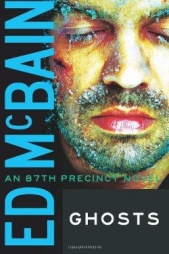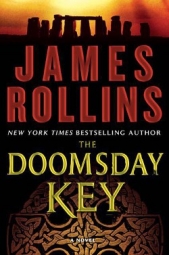Ghosts

Ghosts читать книгу онлайн
It’s Christmastime and Detective Carella gets assigned three murders — including a bestselling author of ghost stories — and is soon after ghosts, mediums, and a crazed killer.
Внимание! Книга может содержать контент только для совершеннолетних. Для несовершеннолетних чтение данного контента СТРОГО ЗАПРЕЩЕНО! Если в книге присутствует наличие пропаганды ЛГБТ и другого, запрещенного контента - просьба написать на почту [email protected] для удаления материала
“She’s helping me with the case,” Carella said.
“You can bring her in, too, if that suits you; no sense her freezing her butt off in the hallway. Terrible draft in that hallway.”
“Yes, sir, thank you,” Carella said.
“Well, that’s it, I guess,” Hollister said, and shrugged and left Carella alone in the room. Carella poked his head outside the door. Hillary was still cooling her heels on the bench, impatiently jiggling one of her crossed legs.
“Come on in,” he said, and she rose instantly and came down the corridor, the heels of her boots clicking on the wooden floor.
“What’ve you got?” she asked.
“Record of the inquest.”
“We’d learn more at the Bight,” she said.
Carella turned on the desk’s gooseneck lamp and then pulled up a chair for Hillary. She did not take off the raccoon coat. Outside, it was already beginning to snow. The clock on the wall ticked off the time: seven minutes to 3:00.
“I want to make this fast,” Carella said, “and get out of here before the storm hits.”
“We have to go to the Bight. And the house Greg rented.”
“If there’s time,” he said.
“We won’t get out in any event,” she said. “They’ve already closed Route Forty-four.”
“How do you know that?” he asked, and she gave him a weary look. “Well…let’s hurry, anyway,” he said. “Did you want to look at this with me? Is there anything here that…”
“I want to touch the papers,” she said.
After her performance with her sister’s coat, he knew better than to scoff at her request. In the car on the drive to Massachusetts, she had tried to explain to him the powers she and others like her possessed. He had listened intently as she told him about extrasensory perception and psychometry in particular. She defined this as the ability to measure with the sixth sense the flux—or electromagnetic radiation—from another person, most often by touching an object owned or worn by that person. People blessed—“Or sometimes cursed,” she said—with this gift were capable of garnering information about the past and the present and sometimes, in the case of particularly talented psychometrists, even the future. She explained that one might consider time, from the psychic point of view, as a huge phonograph record with millions upon millions of ridges and grooves, containing millennia of recorded data. The psychic, in a sense, was someone with the extraordinary power of being able to lift the metaphoric arm of a record player and drop the needle into any of the grooves, thereby reproducing in the mind any of the preserved information on the disc. She was not quite certain how this worked concerning future events; she had never been able to prophesy with any amount of accuracy something that was about to happen. Clairvoyance, clairaudience, and clairsentience all were talents beyond her meager capabilities. But she was entirely certain of her power to intuit correctly, from any object’s electromagnetic leak of energy, the events—past or present—identified with that object. She had been able to do this with her sister’s coat yesterday because the coat had come into contact with the killer’s knife, and the knife had been held in the killer’s hand, and the flux had been strong enough to transfer itself from human being to object to yet another object. Her dissertation, soberly delivered, did much to convince Carella even further that she did possess powers he was incapable of reasoning away.
Sitting at the desk beside her now, he opened the case folder and began reading. She did not read along with him. She simply touched the upper right-hand corner of each page, the way one might have if attempting to dog-ear it, holding the page between her thumb and index finger, feeling it as she might have felt a fabric sample, her eyes closed, her body slightly swaying on the chair beside him. She was wearing a heady perfume he had not noticed on the car ride up. He assumed her psychometric concentration was creating emanations of her own by way of body heat that hyped the scent of the perfume.
According to the Coroner’s Inquest held on the sixteenth day of September, three weeks after the fatal drowning three summers ago, Stephanie Craig had been swimming alone in Hampstead Bight between 3:00 and 3:50 in the afternoon, when, according to observers on the shore, she suddenly disappeared below the surface. She came up twice, struggling and gasping for breath each time, but when she went under for the third time, she did not surface again. One of the eyewitnesses suggested at the inquest that Mrs. Craig (apparently she still used the “Mrs.” form of address four years after her divorce from Craig) may have been seized from below by a shark “or some other kind of fish,” but the Board rejected this at once, citing the fact that there had been no blood in the water and perhaps mindful of the many recent books and motion pictures that had done little to encourage the flow of tourists to ocean-side communities; the last thing on earth Hampstead needed was a shark scare—or any other kind of fish scare. The Board had conducted its inquiry meticulously, eliciting from Mrs. Craig’s handyman the information that she’d left for the beach at 2:30 that afternoon, taking with her a towel and a shoulder-slung handbag and telling him she planned to “walk on over to the Bight for a little swim.” She was wearing, as he clearly recalled, a blue bikini bathing suit and sandals. Witnesses at the beach recalled seeing her walking to the water’s edge, testing the water with her toes, and then coming back from the shoreline to put down her sandals, her towel, and her handbag. One of the witnesses mentioned that it was the “first darn sunny day we’d had in weeks,” a comment that must have done little to gladden the hearts of the two Chamber of Commerce members on the Board.
Stephanie Craig went into the water for her swim at 3:00 P.M. The Bight was even calmer that day than it normally was. Protected by a natural-rock breakwater that crashed with ocean waves on its eastern side, fringed with a white sand beach rare in these parts, it was a safe, current-free place for swimming and a favorite among locals and tourists alike. There were sixty-four people on the beach that day. Only a dozen of them witnessed the drowning. Each and every one of them told exactly the same story. She suddenly went under, and she drowned. Period. The medical examiner’s report stated that there were no contusions, lacerations, or bruises anywhere on the body, dismissing once and for all the notion that a shark “or some other kind of fish” had seized her from below. The report further stated that the body had been delivered to the morgue clad only in the panties of the bikini bathing suit, the bra top apparently having been lost in Mrs. Craig’s struggle to save herself from drowning. Findings for drugs or alcohol had been negative. The physician conducting the examination could not state whether a cramp had been the cause of her sudden inability to stay afloat, but the board nonetheless decided that the probable cause of the accident was “a severe cramp or series of cramps that rendered Mrs. Craig powerless in water estimated on that day to have been twenty feet deep where she was swimming.” An eyewitness on the beach said that she went under for the last time at ten minutes to 4:00; that meant she’d been swimming for close to an hour in waters not known for their cordial temperatures. But Stephanie Craig had been the winner of three gold medals on Holman University’s swimming team, and the Board’s report made no mention of this fact.
Carella closed the folder. Hillary passed her hands over the binder and then opened her eyes and said, “It wasn’t an accident. Whoever typed this report knows it wasn’t an accident.”
Carella checked the report’s first and last pages to see if there was a typist’s name or initials anywhere on them. There was not. He made a mental note to call Hollister and find out who had done the typing.
























